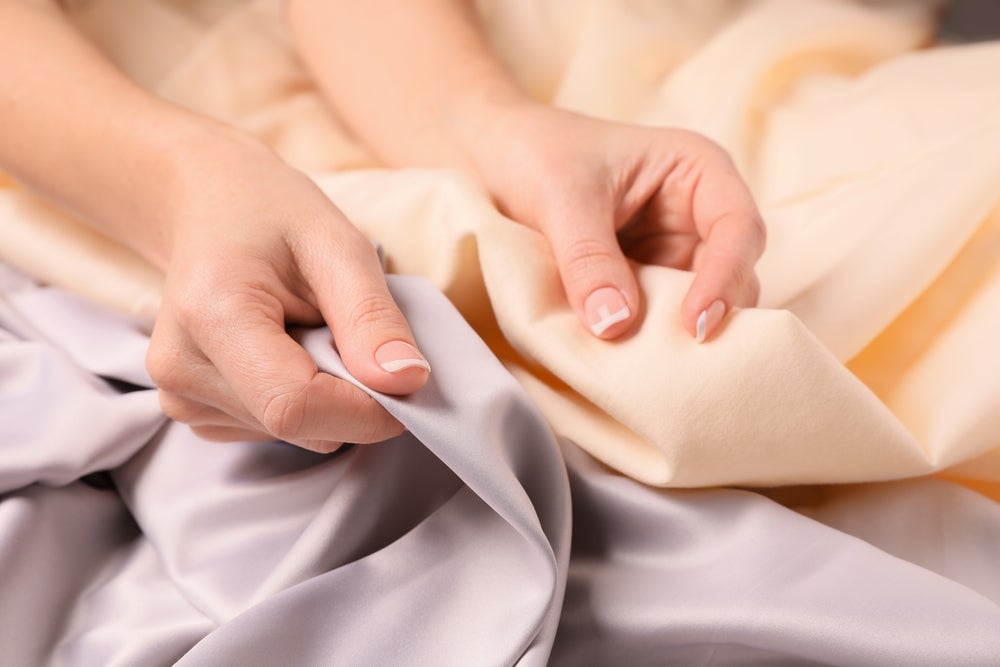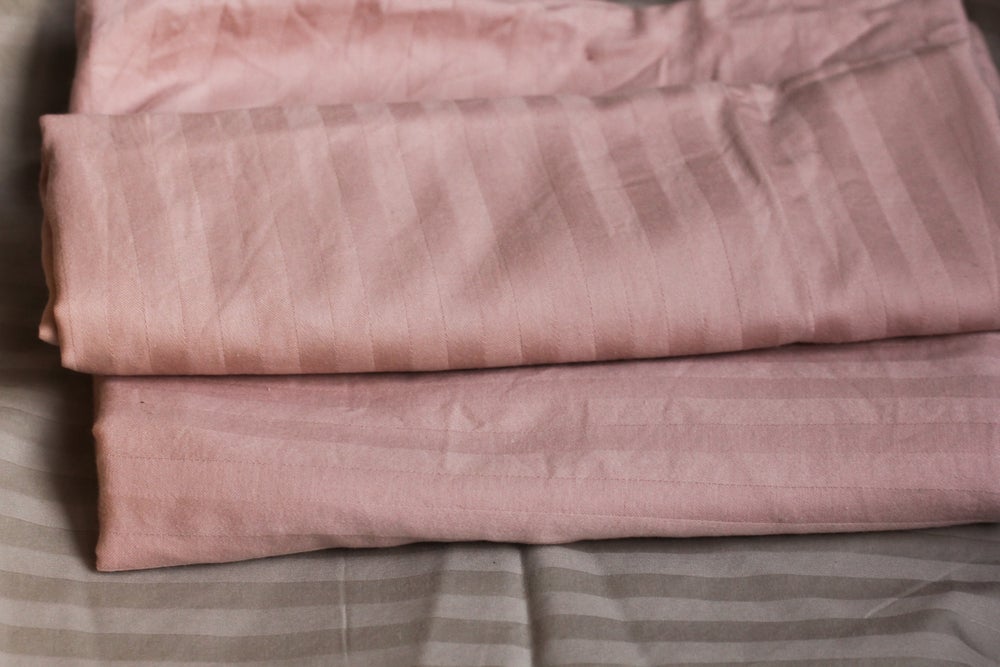With so many different style sheets on the market, you may find yourself wondering which type of sheet would be the best suited for you. There are cotton blends, thread counts, and textile materials to consider, but two of the more luxurious styles of sheets on the market are Supima cotton sheets and Egyptian cotton sheets.
Supima and Egyptian may both be superior textiles, but which of these would best suit your sleeping needs? Both have high durable fabrics that promote softness and comfort, but it’s up to you which fabric would better suit your needs. We’ve set up a rundown on each to better understand the complexities of both styles of fabric.
| Supima | Egyptian |
| Longer threads for durability | Softer, thinner fibers |
| Promotes breathability | Anti-pilling |
| Gets softer over time | Also gets softer over time |
Supima or Egyptian?
Although both of these fabrics promote durability and softness, the differences between Supima and Egyptian are clear. Supima fabrics are woven with long fibers that promote strength and softness. With a higher thread count, Supima can last for years and years, only becoming softer throughout use. Egyptian cotton, also with longer fibers, has a thinner compound, making the fabric softer with a higher thread count. Both fabrics do well in commercial washing machines and dryers. They are both luxurious fabrics that are reasonable for everyday use.
Cost-wise, both Supima and Egyptian sheets are comparable. A good rule of thumb to keep in mind – the higher the thread count, the higher the price. But rest assured that both fabrics will equally last a long while, even after countless uses and countless washes. This is an especially economical factor to consider for a household with kids or a large family. It’s not uncommon to use Supima and/or Egyptian sheets throughout the whole house since they are both durable and strong fabrics.
Which is better?
Although each of these fabrics has its distinctions, it’s nearly impossible to choose one over the other. Many factors come into play when considering which sheets would be best for you, but that is up to you, the individual and what you need from these sheets. Comfort, durability, breathability, longevity – these sheets will only tell their true value to you once you try them out. Thankfully, you can typically be able to fee or maybe even use the fabrics since warranties are typically tied behind these types of purchases. Check your store policies before making any final purchases, especially if you are on the fence about which to choose.
While Supima has those longer, finer fabrics that ensure strength, Egyptian have long fibers that promote breathability and softness. These are both interesting fabrics that will withstand many uses and washes. Both types of the sheet are single-ply, which means that they both add to airflow and breathability throughout the fabric. This is especially beneficial to anyone who tends to sweat at night or wake up continuously from becoming too warm. These are great cotton sheets for the warmer months, too, since they both promote coolness and airflow.
Supima Sheets
Cost
Supima sheets will typically cost you anywhere from $30 to $80, depending on the thread count and style. They are easily found in any home or retail store that sells home furnishings and each type of brand that manufactures Supima will have their own luxurious factors tied into them.
Features and Maintenance
The Supima sheets are used with Supima cotton, a highly durable and soft type of cotton. Although Supima is a luxurious type of sheet, the luxury will not get in the way of the product since it is both durable and easy to maintain. You can wash these sheets normally and use them without worry. Maintain these sheets as you would with your other bedding items.
Warranty
Each manufacturer and store will have its own warranty policies, so it’s best to consult management on the terms of return before purchasing to make sure you can get a refund.
Egyptian Cotton Sheets
Cost
Much like the Supima sheets, Egyptian cotton sheets are durable, luxurious and soft to the touch. Over time, the sheets will only redeem themselves in cost, which is comparable to the Supima sheets, anywhere from $20 to $100, depending on brand and type.
Features and Maintenance
Also comparable to the Supima cotton, Egyptian cotton sheets are easy to take care of and you can wash them regularly and normally. Treat them as you would any of your other luxury bedding items and they will only get softer and prove their durability. In fact, Egyptian cotton is known for its anti-pilling fabric, which means those tiny balls of fuzz won’t appear on the fabric, no matter how often you wash or use them. The fabric holds up over time.
Warranty
Again, each department store or manufacturer varies, so make sure that you know the warranty or refund policies before making a final purchase. Usually, these are a simple process, but again, each store is different so make sure you’re mindful of them.
You may want to read: The Best Cotton Sheets
Conclusion
No matter which type of sheet you choose, both the Supima and the Egyptian cotton sheets are sure to be luxurious and please you time and time again. Even after countless washes, each of these luxurious fabrics is sure to hold up and maintain their soft feel. This is especially great if you are someone who doesn’t like to switch up the bedding too often and are happy with sticking to the same type of sheets.
So, which type do you prefer? Maybe you won’t be able to come to a final decision until you try these fabrics out for yourself, but what’s great is that you typically can do that. Hopefully, through this rundown on each, it will help you on your way to your decision and you’ll be able to choose one of these superior cotton sheets. Both are also easy to find, so you won’t have to look very far for comfort.
Photo credit: All About Space/Shutterstock; New Africa/Shutterstock; Alenamos/Shutterstock
Frequently Asked Questions
Which sheets are best for sensitive skin?
Both Supima and Egyptian cotton sheets are ideal to sleep on for anyone with sensitive skin. Supima sheets are especially beneficial for allergy sensitive people since they resist mold and dust mites. However, to make sure the sheets don’t irritate your skin, make sure they are made from 100 percent organic cotton, as these will not contain harmful chemicals or pesticides that could irritate your skin or cause an allergic reaction. Also, with Egyptian cotton sheets, while some people report the sheets feel scratchy on their skin, that can only occur when they are new. The sheets will become softer with each washing, so if they are scratchy at first, the sensation will dissipate with use and washing.
Where does Supima cotton come from?
The Supima cotton used to make sheets is a brand name of pima cotton and is also a trade name used by a group of pima cotton growers who adhere to certain standards of quality and labeling. Supima cotton is grown in the USA only in the west and southwest states of California, Arizona, Texas, and New Mexico. So, while all Supima cotton is American pima, but not all pima is Supima.
Are there different types of Egyptian cotton?
Like other countries that grow cotton for use in clothing and sheets, Egypt grows a variety of different types of cotton. These are categorized by the length of the cotton fiber, or staple, so you will find extra-long staple, long-staple and regular cotton. There are differences in the quality and performance of these varieties. For the softest and most durable Egyptian cotton sheets that are breathable and won’t pill, make sure the ones you purchase are made with extra-long staple cotton fibers.
Is a high thread count important?
It is generally agreed upon that the higher the thread count, the softer the sheet, and the more likely it will wear well — or even soften — over time. However, what the sweet spot number of threads is for Supima and Egyptian cotton sheets is not always clearly defined, since many opinions offer a range. Among sheet industry experts, there is a general consensus that a thread count of between 300 and 500 is optimal, although some sheet brands claim a 1,000 thread count, with the inference that these are of superior quality. You will pay extra for sheets claiming a thread count above 800 or 900, and while that would be your choice, it is not necessary, since a thread count of 300 or 400 will not disappoint.

